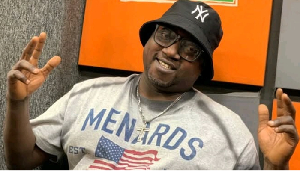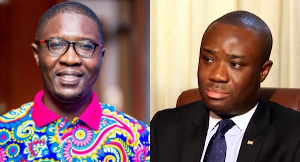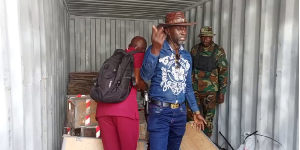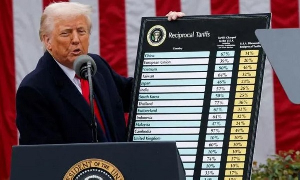By Dr. Michael J.K. Bokor
Sunday, May 6, 2012
Let’s be serious in any discussion of our leadership problems. Here is something to start with (from the great J.E. Casely Hayford’s propositions on Leadership in West Africa):
The story goes that a flock of birds once set out to find a king. And they climbed a high mountain if only they could find him there. And they climbed and climbed until they scaled the topmost peak, and there they did find him. But—he was only a bird!!!
The lesson is clear: the king of a bird is no different from the birds that set out to find him. Disgust, disillusionment, disappointment, and regret? Your guess is as right as mine. Ghanaians may be looking for a leader of a different kind but are those parading themselves all over the political landscape any different from those we already have? We want to be sure that they are different before we commit ourselves into their hands.
Our democratization demands that if one leader proves to be incompetent, he must be voted down; but the decision must be carefully made in order not to bring in the worse of the two devils. So far, the NPP’s Akufo-Addo is the most vociferous in the appeal for voter attention; the PPP’s Paa Kwesi Nduom is no new comer, but he seems to be re-echoing much of the NPP’s cries and portraying a mirror image that doesn’t turn my crank. He is running a one-man show, which isn’t the way forward.
Only three distinct traits characterize Akufo-Addo’s politicking: “huhudious” promise- making, a frontal attack on President Mills’ personality and leadership style, and a looming threat of "All-die-be-die." Take these three traits out of the equation and he stands exposed as lacking anything to suggest that he has the acumen that Ghanaians are looking for in those needed to help solve the country’s problems of underdevelopment.
It is no secret that President Mills’s leadership style is problematic at several levels—he is too laid back and allowing a laissez-faire approach to governance to create the impression that his government isn’t well organized. Many happenings confirm it as not being an organic whole.
There are too many fault lines that have developed because he seems not to be exerting his powers to rein in the ambitions and overzealousness of his appointees. This laissez-faire attitude is the cause of the Woyome scandal and many others that have manifested as the gross indiscipline that motivated the so-called NDC foot-soldiers to visit mayhem on the system (forcibly taking over lorry parks and public toilets and chasing public officers out of their offices, among other acts of outright hooliganism).
The President’s seemingly laid-back approach to governance has also had a negative sequel at other levels, especially the political violence perpetrated by NDC activists in Odododiodio and other parts of the country. Additionally, the fracas in the NDC could have been managed better had the President been more proactive and committed. He has a big price to pay.
He seems not to see the urgency of the situation, allowing his so-called “pacifist element” to cloud his sense of judgement, which will cost him dearly. It is now clear that he is bearing the flag of a party that is fractured. How does he hope to win the elections convincingly with such a run-down political edifice?
Given this state of affairs, one might think that Akufo-Addo will adopt better strategies to turn the table against the incumbent. His “Listening to the people” tour ended abruptly, apparently because he seems not to have it properly laid out and coordinated enough to be sustained for long. Or is it because he has gathered enough complaints from those he has already interacted with to conclude that his kitty is too full to take in more? Or that he wants to use a better approach? (Like what, though?)
Of course, we know that after the NPP had launched its campaign for Election 2012 with a non-denominational church service at Essipon, the stage was set for it to go all out on all fronts to roll out its alternative development strategies to woo the electorate. Nothing so far to write home about except promises and the lambasting of President Mills. Flogging a dead horse won’t win votes!!
This is where the problem thickens for Akufo-Addo. Having been taken to the cleaners over dirty allegations over the years, he already has a huge credibility problem. The fact that nobody is openly revisiting those allegations doesn’t mean that they have fallen into oblivion.
Instead of expending energy to prove that he is more endowed with the requisite leadership skills, he is fixated on condemning President Mills as if that will open “Sesame” for him.
Having already labeled President Mills as “Professor Do-Little,” and going ahead to say that the Woyome scandal couldn’t have happened under the watch of a government headed by him, he opened himself to many probing questions, all related to his own shoddy performance as Minister of Justice/Attorney-General and that of Foreign Affairs. Did I hear that some diplomatic passports being kept in the vault of his office when he was the Minister of Foreign Affairs vanished? Or that some drug barons ……? (You can complete it yourself.) These instances are equally scandalous, right? Certainly, Akufo-Addo is throwing stones and acting as if he is not living in a glass house.
Now, let’s bring the matter closer home. Akufo-Addo has just been reported as asking President Mills to “sit up” and “to act as a responsible leader in the run-up to the December general elections.”
If President Mills sits up, will there be any need for Akufo-Addo to contest the elections at all and hope to unseat him? He has already reduced to absurdity his own political ambitions. This person is not a politician who knows how to do politics to win elections. Where does he place his own belligerence, couched as “All-die-be-die”? Or Kennedy Agyapong’s “madness,” which he has refused to condemn?
In fact, he may be best qualified as a political activist and praised for leading street demonstrations (especially the “Kume Preko,” “Wie Me Preko,” and “Sie Me Preko” demonstrations organized by the defunct Alliance for Change) or being active in political organizations fighting Rawlings’ military dictatorship. I doff my hat off for him on that score. A political activist he still remains.
But to regard him as a future President for Ghana is out of the equation for me. I don’t see what he has to be so. He isn’t coming with anything different except the mentality of a hurt elephant—the only animal which, once hurt, neither forgives nor forgets!!
My hunch is that he is just the déjà vu type that will not make any marked difference in our national life. I have good cause to say so because he hasn’t provided anything to persuade me that he is of a different calibre than those we have already written off as bad debts.
I am dead serious about my concerns and challenge anybody who thinks otherwise to list Akufo-Addo’s leadership qualities to change my perception of him. Until then he remains to me the same side of the political coin that has lost its lustre. He is nothing more than a firy, fast-talking, conservative democrat. Ghana deserves better. He may be vocal, theatrical, and insistent on airing his contempt for the Mills government, but he hasn’t given me the faintest urge to be optimistic that he will move Ghana forward. At 69 years, I daresay that he has seen better days. Only one thing is motivating his struggle to be in power: he sees the Presidency as an entitlement and must do all he can to wrest it from the incumbent. As far back as 1996 when he stood against Kufuor at the NPP’s Sunyani congress for the flagbearership, Akufo-Addo hasn’t ceased nursing that urge of regarding the Presidency as his entitlement. From his political rhetoric and the zeal with which he has institutionalized the “All-die-be-die” craze among his party’s followers, one is not in the least mistaken that he wants to realize his ambition at all costs.
He might have said that he won’t shed a single Ghanaian’s blood to be in power; but it is all an unconvincing damage control measure that has backfired already in the face of current happenings. His refusal to comment on the Kennedy Agyapong hate speech betrays him. If he were an astute politician, he would make his personal voice heard on the matter and use it to reinforce his claim not to shed or cause to be shed a single Ghanaian’s blood in the pursuit of his deep-seated political ambitions.
But he hasn’t done so, which clearly sets him up as a double-faced modern-day Ghanaian version of the Roman god, Janus. He is looking both ways simultaneously: seeing defeat staring at him if he fails to outmatch the incumbent (hence, his insistence on the inspiration-inducing “All-die-be-die” war cry), and buoyed up with some hope that for as long as he leads the NPP’s frontal attack on President Mills, he will prevail over the electorate, on the other side. That is why we see much ado about nothing in his politicking. The real issues that we need to be sure that he is a better quality material are missing. They are just not there for us to see. Why should we then go for him?
As far as I am concerned, our democratization efforts should not just be directed at replacing one government with another just for its own sake. We must do so only to assure ourselves that those we kick out have failed to prop up the democracy in ways other than what we already detest as incapable of solving our problems.
Those we bring in must certainly have better means to solve those problems. If we allow mere sentiments to determine our electoral decisions, we can’t move our democracy beyond this “procedural” stage (characterized by mere political rituals of holding elections and putting new wine in an old fermented wine bottle).
We aspire to the “substantive” stage of democracy where “equity, justice, civil liberties, and human rights prevail; where citizens enjoy freedom, interests are represented via elected public fora and group participation, and all citizens have equal access to governmental process and have a say in collective decision-making [regarding the national cake]” (Jonathan Haynes, Democracy and Civil Society in the Third World. Cambridge, England: Polity Press, 1997, p. 85.) Our democratization calls for the kind of leadership that will make the difference. If President Mills’ leadership style is problematic (as his critics believe), then, we need a better one, not what Akufo-Addo represents. Otherwise, we will continue to run around in circles until we drop down dead in the midst of over-abundant national resources. What is wrong with us in Ghana, the first country to gain independence south of the Sahara?
• E-mail: mjbokor@yahoo.com
• Join me on Facebook at: http://www.facebook.com/mjkbokor
• Get a copy of my novel, The Last Laugh (PublishAmerica.com, April 2009)
• Coming out soon: The Story of the Elephant, a novel
Opinions of Monday, 7 May 2012
Columnist: Bokor, Michael J. K.
If President Mills must go ...
Entertainment



![Kwesi Pratt Jr [Left] and Ahmed Ibrahim [Right] Kwesi Pratt Jr [Left] and Ahmed Ibrahim [Right]](https://cdn.ghanaweb.com/imagelib/pics/884/88455494.295.jpg)









